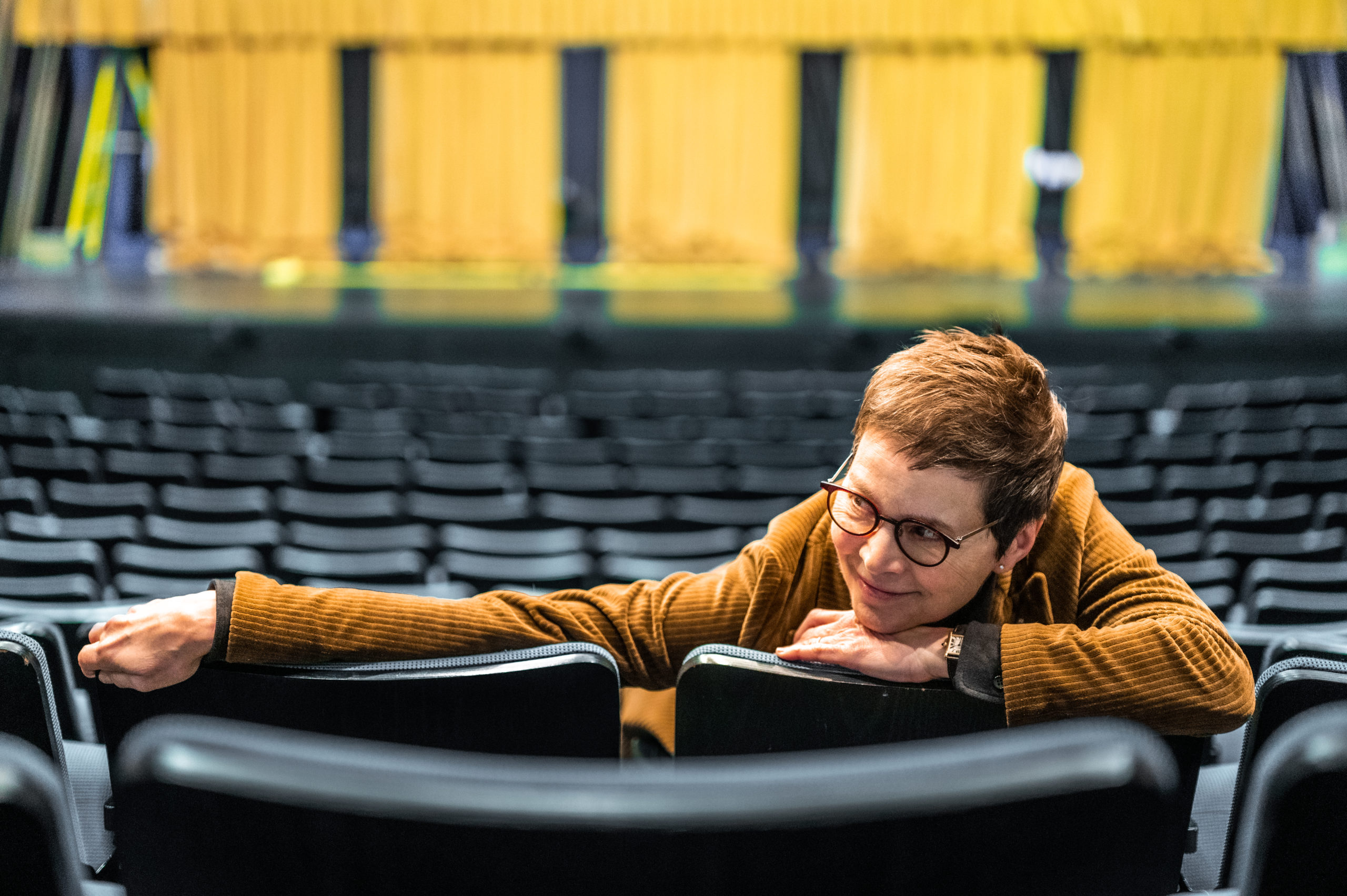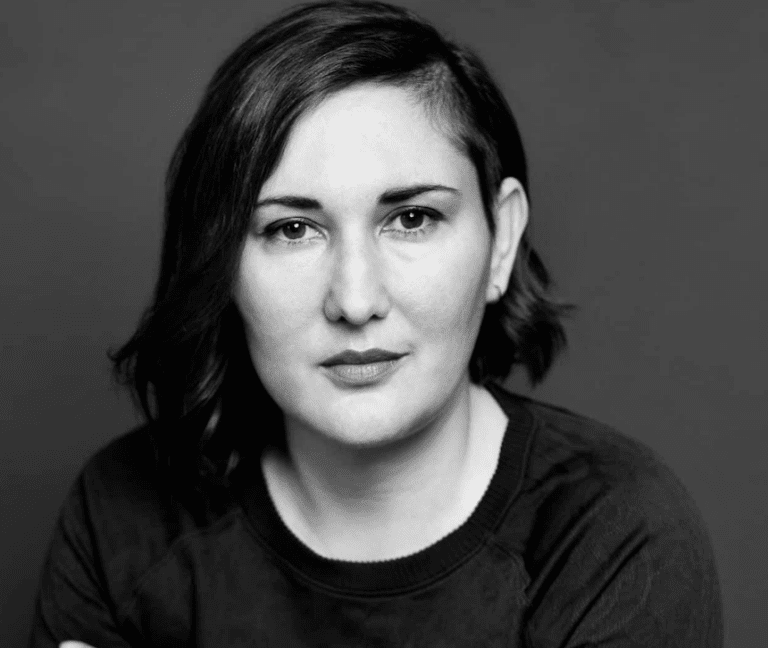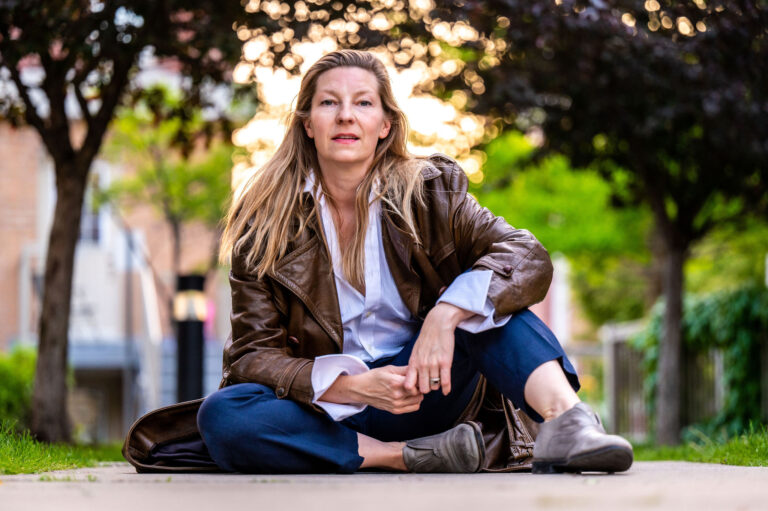Spotlight: Ann-Marie MacDonald
A self-described “shrimp” as a kid, Ann-Marie MacDonald is not, you might say, an imposing figure physically.
Except, of course, her decades-long impact on Canadian storytelling as an actor, playwright, novelist, and CBC Television host contrasts that fact. She might be small in stature, but a career like hers requires nothing but fierce, ferocious tenacity.
“You bleed through the eyeballs to get anything done artistically. Don’t believe anyone who says that it’s inevitable. The goal is always to make it look easy. And of course, here I am, I’m blowing that right? I’m saying, ‘Hey everybody, it’s not easy,’” MacDonald told me over the phone from Toronto.
There is scarcely a medium MacDonald, now 64, has not dived into since graduating from the National Theatre School’s acting program in 1980. She starred in Patricia Rozema’s 1987 sold-out Cannes hit dramedy I’ve Heard the Mermaids Singing. Her 1988 playwriting debut Goodnight Desdemona (Good Morning Juliet) won the Governor General’s Award, the Floyd S. Chalmers Canadian Play Award, and the Canadian Authors Association Drama Award. She hosted CBC Television’s Life and Times and Doc Zone for seven and eight seasons respectively.
And her fourth novel — Fayne, a 700-page generations-spanning epic set in a remote Scottish castle — was published in November 2022.
But finishing that novel wasn’t easy. Two years into writing it, MacDonald began experiencing symptoms of seronegative rheumatoid arthritis, and she was officially diagnosed in 2019. She spent the next two years completing her longest novel yet mostly strapped to a chair, alone, in New Brunswick.
“I’m happy to say I seem to have come through it, which was no picnic. Often there is no end in sight,” she said.
And after all, it only delayed the book one year.

You can recognize this fiery spirit throughout her novels’ characters: Mary Rose MacKinnon, the author living with her theatre director wife and two kids in Toronto in 2014’s Adult Onset; Madeleine McCarthy, a headstrong 9-year-old on a rural Ontario army base in 2003’s The Way the Crow Flies; or any of the Piper daughters in her best-known novel, 1996’s Fall On Your Knees, which earned MacDonald the Commonwealth Writers Prize and a spot on Oprah’s Book Club.
Much like her stories, the source of her determination is also found in her personal life.
“My father actually kind of romanticized stamina. There were always stories of great stamina, and courage against all odds. But I took him literally, so I had to prove it,” MacDonald said. “As a very, very young child, I would perform feats of physical stamina. I actually then convinced myself that I was indestructible and incredibly tough. Which, if you ever met me, you’d go, ‘You shrimp, what are you talking about?’ But I had this myth, you know, that you just keep going.”
“And then I had the actual example of my mother, who was tireless, a four-foot-11-and-a-half pure Energizer Bunny. I think I adhered to what I now recognize as a kind of a romantic notion of, you know, battered, bloodied and defeated, walking across the finish line,” she said.
Now, after coming through a potentially life-altering illness, MacDonald is entering a moment of renaissance. In the last six months, in addition to launching Fayne into the public, MacDonald premiered a new play at the Stratford Festival — Hamlet-911, directed by her long-time artistic collaborator and wife, Alisa Palmer — and is about to unveil the highly anticipated world premiere of the stage adaptation of Fall On Your Knees.
“I think a lot of people can relate it to the post-COVID glut, just trying to run as fast as I can, along with everyone else, to catch up to where we were supposed to be two years ago. What was supposed to be spread out is now just absolutely cheek by jowl,” MacDonald said.
Art is magic, and theatre is magic, and literature is magic.
A sprawling story of the Piper family set on Cape Breton Island (with a subplot in New York City), Fall On Your Knees has come to define MacDonald’s career, although theatre was her entry into telling Canadian stories. Out of school, MacDonald first started creating original pieces with other women theatre artists, notably This Is For You, Anna, and Nancy Drew: The Case of the Missing Mother with Beverly Cooper. Her best known collective piece, The Attic, the Pearls and Three Fine Girls, premiered in 1995 with Jennifer Brewin, Martha Ross, and Leah Cherniak, directed by Palmer.
It was through these plays — as well as Goodnight Desdemona (Good Morning Juliet), with its irreverence towards theatre tradition, its feminist message, and an onstage lesbian romance — that MacDonald first emerged onto the scene as a powerful storyteller of queer women’s stories in Canadian theatre.
“I wasn’t allowed to write [feminist queer stories]. And I was afraid I was going to get nailed to the cross for doing so,” MacDonald said, with a twinge of fear, despite nearly three decades of consistent work and success in between then and now.
“But I do believe that what I write and what I do is of a very great importance. I know that I’m contributing to something that is absolutely essential to people, and that is stories. And I know how badly we all need them.”

Moving into novels, the mainstream success of Fall On Your Knees only cemented what MacDonald started in her theatre work. It’s a strongly feminist story about perseverance, art, faith, and courage, with a spellbinding journey into queerness and gender identity. With the stage premiere, its reemergence into the Canadian cultural conversation in 2023 has revealed its relevance to another generation of Canadian theatre makers.
“I’m really pierced by the issues, the way the place struggles with the effects of abandonment and neglect and racial oppression and prejudice. And the way it centres women and children especially, and humor and music, also. Because, this is life, right? We weather these storms and we find some way to survive while we’re suffering,” said actor Amaka Umeh, who in 2022 was the first Black actor to play Hamlet at the Stratford Festival, in an interview. She’s another artist who knows what it’s like to break boundaries.
Umeh was totally new to the material when she was cast in the summer of 2022. Learning the play alongside reading the novel for the first time was an education.
“I don’t think I’ve ever really encountered anything on quite so grand a scale. And at the same time, it’s like a kitchen sink drama. It’s so vast, and yet a lot of it just takes place in this little house by the ocean,” she said.
According to MacDonald, that scale is the biggest reason it has taken so long for a theatrical version of the novel to become real. The play was in development for over ten years, then the 2020 premiere was delayed even further in the pandemic.
“People say, ‘Oh, well of course they’re [adapting Fall On Your Knees].’ But here’s no ‘of course’ about it,” she said.
“This requires such a work ethic. This is not for the faint of anything,” she added, bringing to mind the two major collaborators on the project. Playwright Hannah Moscovitch wrote the script, and Palmer led the development and is now directing the production, including two full-length plays, original compositions and choreography, a cast of sixteen, and a four-city tour (after it premieres in Toronto at Canadian Stage, it will go to the National Arts Centre in Ottawa, the Grand Theatre in London, and the Neptune Theatre in Halifax). MacDonald also drove the encouragement to keep the project moving through so many years.
“I hate to get all nuts and bolts about this, because art is magic, and theatre is magic, and literature is magic. But to make it, oh my God, it’s just crazy, the degree of commitment that you’ve got to have to make something look inevitable,” she said.

And if there’s someone who understands — and shares — the particular tenacity of a long-term artist, it’s Palmer, MacDonald’s greatest collaborator in work, love and family (they have two daughters, eighteen and twenty years old). The two met in Montreal in the late 1980s when they were both on the theatre festival circuit, and MacDonald’s star was already on the rise. Palmer was relieved when the woman she had heard about wanted to talk about art, not fame. Their relationship started professionally — “after that I just declared myself her mentee,” said Palmer — and turned into a lasting romance built on a foundation of those values.
Now, MacDonald also teaches acting and playwriting at the National Theatre School in Montreal, where Palmer is also artistic director of the English section. Together, their art and their family are intertwined, and appear to have eased into a subtle rhythm they navigate in tandem.
She has a real gift for being able to be honest and direct in a way that includes people. And she wrestles with the dragons and the shadows in her art in a way I find really admirable.
“To get you into a career in the arts, you need a big engine. And then there’s a certain time in life where that big engine, if it can get balanced with patience and a long view, can be an amazing development in one’s artistic process. You shift gears from the high intensity to listening for the rhythms that are slower and deeper, and then balancing the two out so you’re assessing what something needs but always sort of listening for the long arc of things. There’s a lot of power in both those dynamics working together,” Palmer said in an interview.
“She was also one of the people in my life who could argue with me. I love a robust argument and she could really hold her own,” she added.
“She has a real gift for being able to be honest and direct in a way that includes people. And she wrestles with the dragons and the shadows in her art in a way I find really admirable.”

As a queer female artist who established herself in the 80s and 90s, MacDonald has needed to be a fighter: for herself, for her collaborators, and for her characters. After 40 years of being in the arts, that sharpness hasn’t dulled — for better and for worse.
Sometimes, like her characters, she takes on challenges above her weight class.
As a kid, it was climbing trees. Now (or just a few weeks ago), it’s challenging her much younger, much bigger hockey teammate to an arm wrestle.
“I did lose, yeah. But I laughed at myself. And I also rejoiced, and I enjoyed every moment of it. Because it’s a hockey player kind of thing, like, of course there has to be an arm wrestle at a Christmas party,” she said, with a self-effacing laugh. “I’m 64 years old, and I survived this horrible autoimmune illness, and this person’s half my age. And, you know what, thank you for actually consenting to do this silly thing with me,” she said.
MacDonald’s stories, as you might imagine, are not shy or simple. Often, they’re dark. Fall On Your Knees alone wades into racism, sexism, abuse, meanness, and depression. “You scratch a lot of people, and certainly artists or anybody involved in any kind of creative endeavor, and they’ll have some acquaintance with certain kinds of suffering,” she said.
If it wasn’t for the twinkle she lends to her work — the same one that laughs after losing an arm wrestle with a hockey player at age 64 — the stories would be downright morose. Readers wouldn’t be able to stand it.
Moreover, neither would she.
“It’s a combination, I think, of a very, very deep empathy, and imagination, and of investing in imagination beyond what is often considered reasonable or practical in our world,” she said, about her longevity in art and life.
“This combination of joy and love of stories, and good health and wellbeing, combined with just enough of the opposite.”










Comments